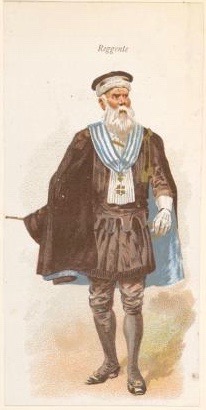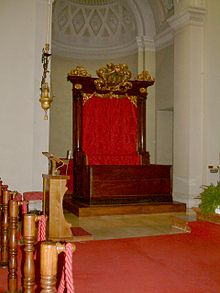
San Marino, officially the Republic of San Marino and also known as the Most Serene Republic of San Marino, is a European microstate surrounded by Italy. Located on the northeastern side of the Apennine Mountains, it is the fifth-smallest country in the world, with a land area of just over 61 km2 and a population of 33,642, as of 2023.
As the only surviving medieval commune in the Italian Peninsula, the history of San Marino is intertwined with the medieval, Renaissance and modern-day history of the Italian peninsula, according to tradition beginning with its foundation in 301 AD.
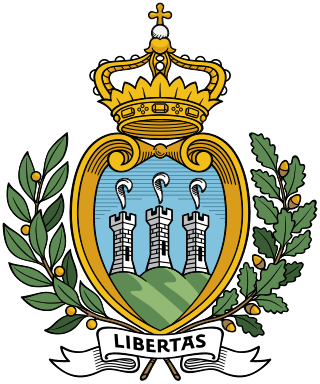
The politics of the state of San Marino take place in a framework of a unitary parliamentary representative democratic republic, whereby the Captains Regent are the heads of state and heads of government. The country has a multi-party system. Executive power is exercised by the government. Legislative power is vested in both the government and the Grand and General Council. The judiciary is independent of the executive and the legislature.
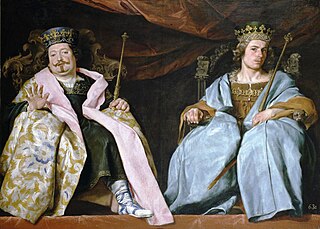
Diarchy, duarchy, or duumvirate is a form of government characterized by co-rule, with two people ruling a polity together either lawfully or de facto, by collusion and force. The leaders of such a system are usually known as corulers.

The Grand and General Council is the unicameral parliament of San Marino. The council has 60 members elected for a five-year term.

The Constitution of the Republic of San Marino is distributed over a number of legislative instruments, the most important of which are the Statutes of 1600 and the Declaration of Citizen Rights of 1974, as amended in 2002.

The Palazzo Pubblico is the town hall of the City of San Marino as well as its official Government Building. The building, where official State ceremonies take place, is the seat of the Republic's main institutional and administrative bodies: the Captains Regent, the Grand and General Council, the Council of XII, and the Congress of State.
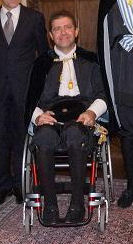
Mirko Tomassoni is a Sammarinese politician, who served as Captain Regent of San Marino for the six-month term from October 2007 to April 2008 and the second term from October 2018 until April 2019. He served together with Alberto Selva in the first term and with Luca Santolini in his second term. He is a Member of the Parliament of San Marino, Member of the ICD Advisory Board, and Minister of Culture of San Marino.

San Marino – United Kingdom relations date back to 1899, when the United Kingdom and San Marino signed an extradition treaty.
Oscar Mina is a Sanmarinese politician, who served as Captain Regent of San Marino with Paolo Rondelli from 1 April to 1 October 2022. He previously served as Captain Regent from 1 April 2009 to October 2009 together with Massimo Cenci.
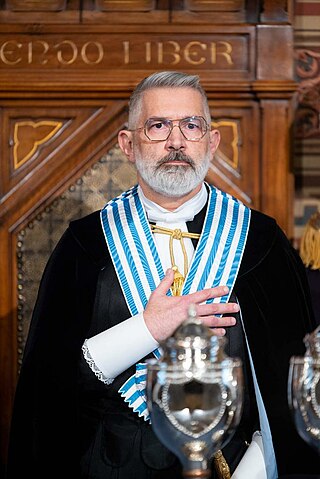
Paolo Rondelli is a Sammarinese politician and diplomat who served as Captain Regent of San Marino alongside Oscar Mina from 1 April to 1 October 2022. He was the world's first openly LGBT+ head of state.

Antonella Mularoni is a Sammarinese jurist and politician who served as Captain Regent of San Marino from April 2013 to October 2013, alongside Denis Amici. Mularoni was the Secretary for Foreign Affairs from 2008 to 2012 and also served as the Sammarinese judge for the European Court of Human Rights between 2001 and 2008.

The fatti di Rovereta was a constitutional crisis in San Marino in 1957 in which the Grand and General Council was deliberately rendered inquorate to prevent the scheduled election of Captains-Regent. A provisional government was established in the village of Rovereta, in opposition to the outgoing Captains-Regent whose term had expired.

General elections were held in San Marino on 4 March 1923 to elect the seventh term of the Grand and General Council. It was a snap election that marked the beginning of fascist rule in the republic. Left-wing parties were prevented from participating, while all centre-right forces ran as a single "Patriotic Bloc". Of the 60 seats, 29 were taken by the Sammarinese Fascist Party, 20 by the Sammarinese People's Party, 9 by the Sammarinese Democratic Union and two by the Fascist-puppets Volunteers of War. Later the country was taken over by the Fascist Party.

In a monarchy, a regent is a person appointed to govern a state pro tempore because the actual monarch is a minor, absent, incapacitated or unable to discharge their powers and duties, or the throne is vacant and a new monarch has not yet been determined. The rule of a regent or regents is called a regency. A regent or regency council may be formed ad hoc or in accordance with a constitutional rule. Regent is sometimes a formal title granted to a monarch's most trusted advisor or personal assistant. If the regent is holding the position due to their being in the line of succession, the compound term prince regent is often used; if the regent of a minor is their mother, and she is wife or widow of the king, she would be referred to as queen regent.

The Guarantors' Panel on the Constitutionality of Rules is the highest court of San Marino in matters of constitutional law. The institution was established with Constitutional Revising Law no. 36 of 26 February 2002, which has amended Article 16 of the "Declaration on the Citizens' Rights and Fundamental Principles of San Marino Constitutional Order". The Guarantors' Panel on the Constitutionality of Rules is the youngest body of San Marino constitutional order. Constitutionality review was previously entrusted to the Great and General Council, but throughout the years this solution had presented several limits.

Alessandro Cardelli is a Sammarinese politician and one of the Captains Regent with Mirko Dolcini, serving from 1 October 2020 until 1 April 2021. During his tenure, he was the youngest state leader in the world and the only head of state under 30 years of age at the time.

Domani – Motus Liberi is a Christian-liberal political party in San Marino. The party was officially formed on April 28, 2018.
Milena Gasperoni is a Sammarinese politician who was one of two Captains Regent for San Marino since April 2024 until October 2024 and served alongside Alessandro Rossi.

